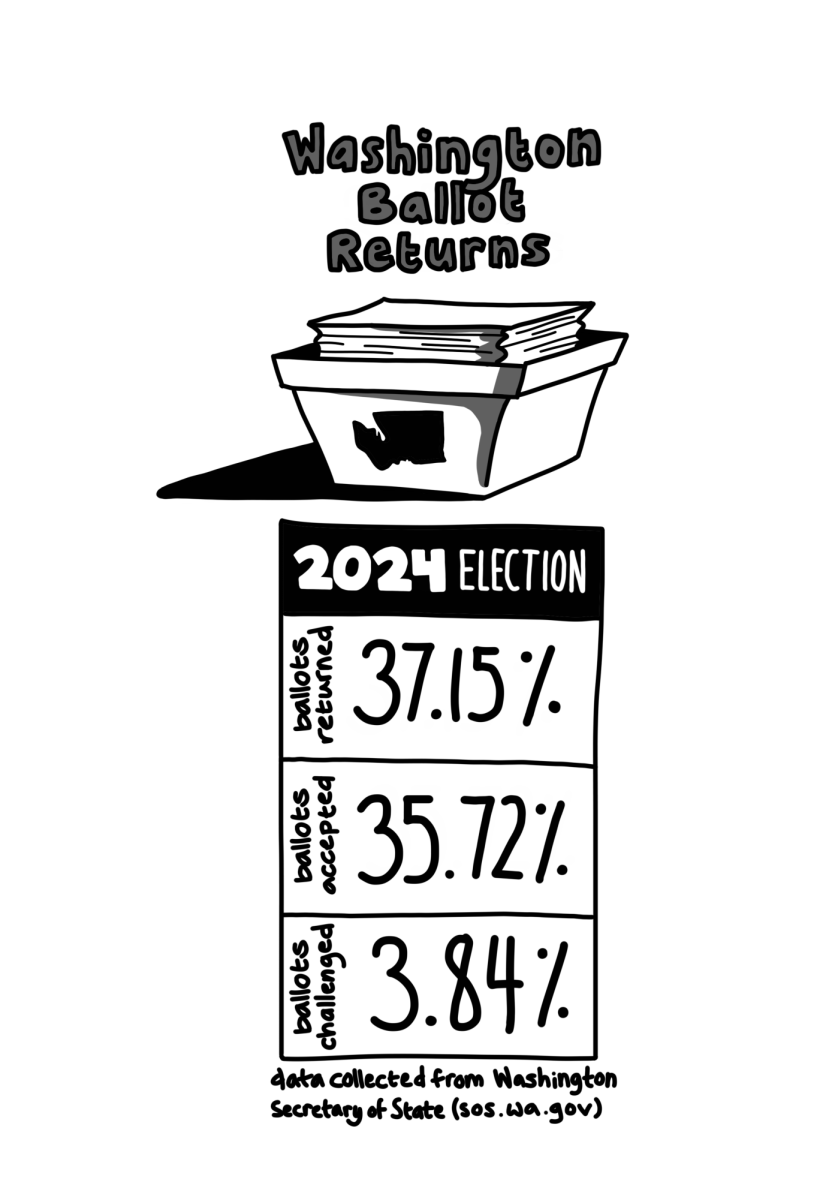Acclaimed journalist Ray Suarez took the stage in a packed Maxey Hall on Tuesday night, Oct. 24, to share his observations about this presidential election with Whitman students and the Walla Walla community.

Suarez has spent more than 30 years bringing local and national news to the homes of Americans. His most recent accomplishments include hosting “Talk of the Nation” on National Public Radio from 1993-99, and now a position as senior correspondent on PBS’ “The NewsHour.” In addition to contributing to several books and writing some of his own, Suarez is a founding member of the Chicago Association of Hispanic Journalists.
His lecture came as the second part of a Whitman series also featuring David Brooks. Though Brooks identifies as conservative and Suarez has been labeled a liberal, both are known for their moderate and reasoned stances on political issues. Both speakers happen to be friends and colleagues––each was well aware that the other was coming to campus and that students would be ready to compare their lectures.
“I’m a little taller than David,” Suarez joked, adding, “because I’m a news reporter and not an opinion writer, I’m a little more restrained by definition.”
Getting down to business, Suarez noted (just as Brooks did last week) that the presidential debates have helped to narrow the gap between Romney and Obama in opinion polls.
“I’m glad to be here at a point in the contest when the outcome looks less certain than it did several weeks ago,” said Suarez. “The amazing thing to me is that anybody wants the job!”
Part of what makes Suarez so distinct as a correspondent is his ability to weave humor into profound and sobering analyses. After coaxing some laughs from the audience, he regained seriousness and added:
“It takes a colossal amount of self-confidence to put yourself in front of a country … and say ‘I can fix it. I got this.'”
No matter who takes office, observed Suarez, there’s a substantial mess to be inherited. In particular, he noted that both candidates are forced to take on problems that neither one of them caused.
“They didn’t create the conditions that the country faces,” he said.
He also noted that each candidate is inevitably defined by these conditions. The public tends to judge candidates by the issues they debate.
“I found his point that we are simply basing our ‘likes’ and ‘dislikes’ of the candidates on the current situation [compelling]. In other words, Obama just happened to become president during a recession,” said first-year Marcus Helm.
A significant point Suarez brought to light is that despite whatever agenda each candidate presents, both are pursuing a position in which they will find very little freedom to realize their proposals.
“When one of them takes the oath, their hands will be tied … by the actions of previous governments,” he said.
This lack of room for political creativity was especially pertinent when Suarez discussed the role of the national debt. Regardless of what domestic policies the next president seeks to enforce, he will find his plans inhibited by the deficit.
“Debt means less room for maneuver no matter who becomes president,” he said.
Furthermore, he discussed how both candidates refuse to openly acknowledge the somber reality behind the state of the U.S. economy. Projecting statistics and looking for corners to cut is one thing, but telling the public that everyday life is not about to become easier is another.
“Both candidates are talking about the national debt … but both are careful with what they say about it … some families will never break even, and they won’t mention that on national TV,” he said.
In particular, Suarez critiqued the candidates’ claims to promote employment among U.S. citizens.
“Both candidates celebrate American workers, and each presents the idea that more jobs should be in this country. And that’s okay, but it depends on the job; most manufacturers are overseas.”
Suarez explained that although the intention of creating more jobs on American soil is good, the reality is that today’s market relies heavily on cheap, foreign labor.
“Neither candidate seems to want to take the risk to talk to voters about … what’s really going on in the world economy,” he said.
He directed his final points toward the audience by reminding them how immediate a role the politics at hand play in their lives. He questioned whether the recent debates brought the most threatening concerns of the American public to light, and whether either candidate is capable of addressing those concerns.
“Some of [the issues] are beyond both of their abilities, but neither one will say it.”
The disappointment many students felt after watching the presidential debates, he claimed, is the realization that the president (and America) is not the answer to the world’s problems.
Ours is a generation that grew up with the perception of America as a country that can solve any conflict and wield so much power; this generation “is having a hard time adjusting,” said Suarez.
When asked to compare their reactions to Brooks and Suarez, Whitman students noted that both speakers had valid, albeit overlapping, critiques of the candidates.
“I feel they both raised issues I hadn’t considered before,” said first-year Tino Mori. “Suarez addressed the idea [that] presidents and candidates can’t admit that they can’t fix everything. Brooks mentioned how political campaigns suffer almost no repercussions for dishonesty. It definitely made me view the debates more critically.”
“I feel that both men believe that this election is a close one––it seems that neither candidate is offering what the public is really wanting. They are restricted,” said first-year Ruth Thirkill.
Suarez and Brooks both expressed a sense of disillusionment with the current state of U.S. politics that resonated strongly with some students attempting to engage in the political process.
“For me, Suarez effectively elaborated a popular critique among people who want to be more actively informed and participatory in political discussions … that this presidential race is little more than a contest to see who can most effectively avoid answering critical questions about the condition of our country,” said junior Ben Harris. “I think it’s important to note that David Brooks made a similar point in his lecture: that neither candidate has actually put forward a specific political agenda for the next four years. Instead each candidate has focused their efforts on not letting the other guy win. And that’s dumb.”















